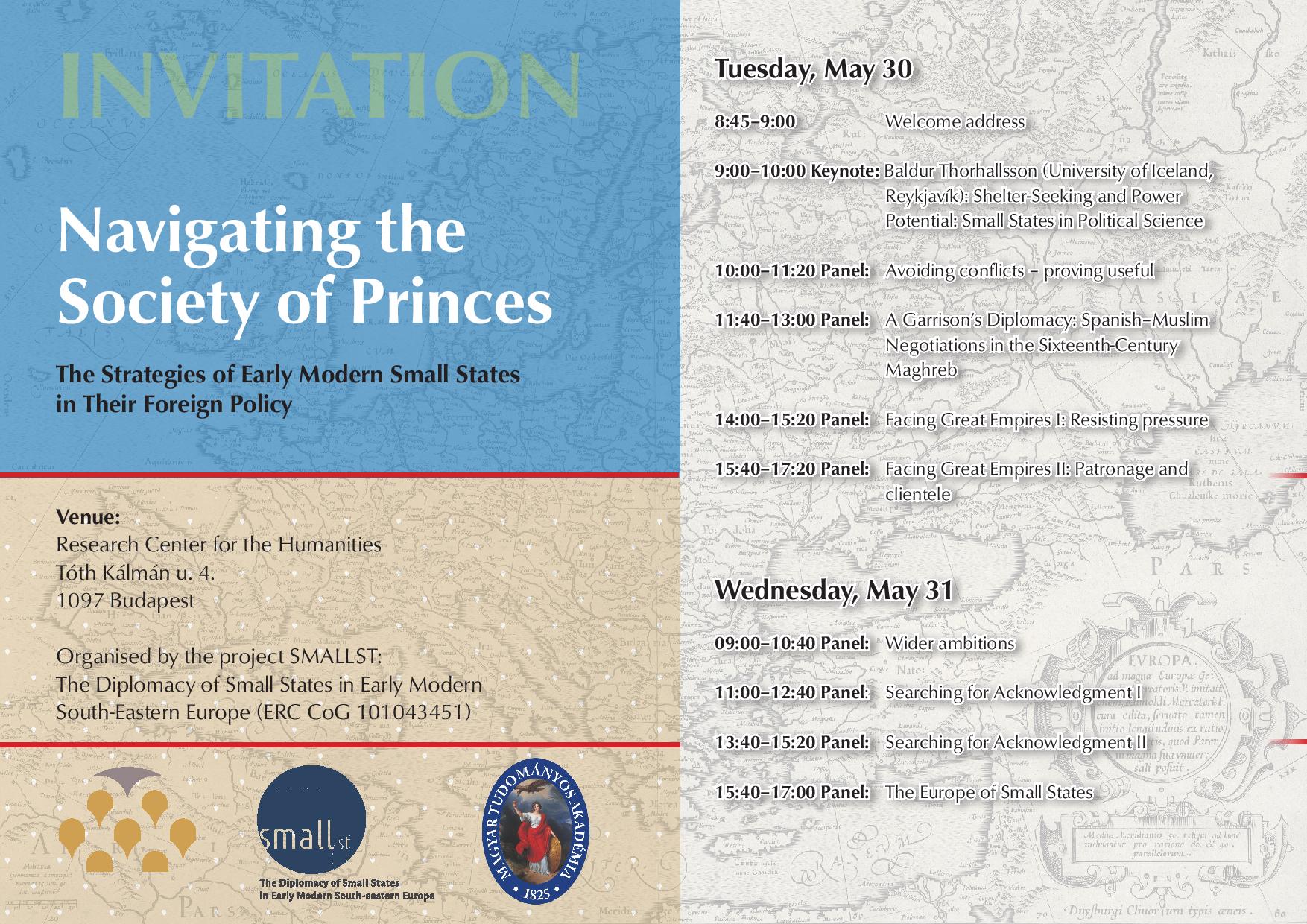

Venue: Research Center for the Humanities Tóth Kálmán u. 4. 1097 Budapest
Organised by the project SMALLST: The Diplomacy of Small States in Early Modern South-Eastern Europe (ERC CoG 101043451)
Navigating the Society of Princes The Strategies of Early Modern Small States in Their Foreign Policy
Tuesday, May 30
8:45–9:00 Welcome address
9:00–10:00 Keynote: Baldur Thorhallsson (University of Iceland, Reykjavík): Shelter-Seeking and Power Potential: Small States in Political Science
10:00–11:20 Panel: Avoiding conflicts – proving useful
Chair: Antal Molnár (RCH Institute of History, Budapest)
Michael Depreter (University of Oxford): Small States on the Marketplace for Military Manpower Agents, Goals, and Methods in The Hague
Vedran Stojanović (RCH Institute of History, Budapest): Neutrality as Necessity: The Republic of Ragusa and the Holy League of 1571
Laura Turchi (University of Modena and Reggio Emilia): The Safe-Belt of Milan: The Principalities of the Po Valley (Second Half of the 16th Century–First Half of the 17th Century)
11:20–11:40 Coffee break
11:40–13:00 Panel: A Garrison’s Diplomacy: Spanish–Muslim Negotiations in the Sixteenth-Century Maghreb
Chair: Géza Pálffy (RCH Institute of History, Budapest)
Rubén González Cuerva (Institute of History - Spanish National Research Council, Madrid): La Goleta, a Reluctant Diplomatic Centre in Hafsid–Habsburg Relations (1535–1574)
Francesco Caprioli (Autonomous University of Madrid): Who Benefits? The Peacekeeping Dialogue between Oran and Algiers (1547–1551)
Miguel Soto Garrido (Center for Social Sciences and Humanities, Madrid – University of Málaga): Ceuta, Centre of Political Intermediation in the Spanish–Saadian Relations (1580–1610)
13:00–14:00 Lunch break
14:00–15:20 Panel: Facing Great Empires I: Resisting pressure
Chair: Ferenc Tóth (RCH Institute of History, Budapest)
Lovro Kunčević (Croatian Academy of Sciences, Dubrovnik): Ragusan Republic and the Great Powers: An Early Modern System of International Checks and Balances
Rieke Becker (University of Paderborn): Weakness as a Trump Card: Strategies of Diplomatic Persuasion of the Regent Christine Charlotte of East Frisia 1665–1690
Ágnes Szalai (RCH Institute of History, Budapest): Transylvania’s Ottoman diplomacy after 1660 at the local level and at the center
15:20–15:40 Coffee break
15:40–17:20 Panel: Facing Great Empires II: Patronage and clientele
Chair: Radu G. Păun (Centre d’études russes, caucasiennes, est-européennes et centrasiatiques, Paris)
Marian Coman (Romanian Academy of Sciences, Nicolae Iorga Institute of History, Bucharest – University of Bucharest): Securing the Succession: The Ruling Lords of Wallachia and Foreign Potentates (Early 15th C. – Early 17th C.)
John Condren (University of Oxford): ‘If the King of France Procures Some Advantage for Him, He Cannot Very Well Refuse It.’ Ranuccio II Farnese, Duke of Parma, as a Pawn between Rome, France and Spain?
Giuseppe Pio Cascavilla (Independent researcher): Quibbles, an Ancient Tribute, and a ‘Holy Hand’. The Legal and Diplomatic Efforts of Ragusa to Obtain the Austrian Protection in 1770–1772
Magdalena Jakubowska (University of Warsaw): Small State Diplomatic Network: The Case of Hospodar Jeremia Movilă and His Correspondence with Poland-Lithuania, 1595–1606
Wednesday, May 31
09:00–10:40 Panel: Wider ambitions
Chair: Lovro Kunčević (Croatian Academy of Sciences, Dubrovnik)
Zsuzsanna Hámori Nagy (RCH Institute of History, Budapest): From Regional Middle Power to Small State: The Formation of the Principality of Transylvania in the View of Its Dynastic Strategies
Dénes Harai (Université de Pau et des Pays de l’Adour) – Álvaro Adot Lerga (Universidad Complutense, Madrid): Negotiations of Dynastic Alliances of the Royal House of Navarre and the Plan for Marrying Isabelle d’Albret to János Szapolyai, King of Hungary (end of the 1520s – beginning of the 1530s)
Massimo Bomboni (University of Torino): A History of Failures: The Global Ambitions of the Grand Duchy of Tuscany at the Beginning of the 17th Century
Johanna Sinclair (University of Oxford): Loco et Tempore: Projections of Strength and Prudence in Ferrara, 1505–1525
10:40–11:00 Coffee break
11:00–12:40 Panel: Searching for Acknowledgment I
Chair: Michał Wasiucionek (Romanian Academy of Sciences, Nicolae Iorga Institute of History, Bucharest)
Ovidiu Cristea (Romanian Academy of Sciences, Nicolae Iorga Institute of History, Bucharest): A Case of Disloyalty? The Treaty of Alba Iulia (20 May 1595): Context and Implications
Marian Hefter (University of Erfurt): An Ambiguous Agreement: The Negotiations of the ‘Corresponding Princes’ on Diplomatic Ceremonial (1700–1701)
Tetiana Grygorieva (National University of Kyiv – Mohyla Academy): The Cossack Ambition: The Claims for Sovereignty from Bohdan Khmelnytsky to Pylyp Orlyk
Murat Yaşar (State University of New York, Oswego): Kabarda and Its Struggle for Freedom and Survival between the Ottoman Empire and Muscovy in the 16th-Century North Caucasus Borderland
12:40–13:40 Lunch break
13:40–15:20 Panel: Searching for Acknowledgment II
Chair: Zsuzsanna Cziráki (University of Szeged)
Natalia Królikowska-Jedlińska (University of Warsaw): In Search of an Alternative Model of Diplomacy? Foreign Relations of the Crimean Khanate in the Years 1624–1637
Thomas Weller (Friedrich Alexander University of Erlangen-Nürnberg): Unequal Partners: The Diplomatic Relations between the Spanish Monarchy and the Hanseatic Cities in the 16th and 17th Centuries
Gábor Kármán (RCH Institute of History, Budapest): Banging on the Door of the Society of Princes: Ferenc Rákóczi II’s Problems of International Acknowledgment
15:20–15:40 Coffee break
15:40–17:00 Panel: The Europe of Small States
Chair: Gábor Kármán (RCH Institute of History, Budapest)
Indravati Félicité (University of Réunion): Diplomacy as a Means of Political Survival? The Ontological Function of Foreign Affairs for the Hanseatic Cities and the Northern Duchies of the Holy Roman Empire in the 17th and 18th Centuries
Konstantinos Poulios (European University Institute, Florence): Small Tributary States as Indirect Players and Topics of Discussion at the Peace Congress of Carlowitz (1698/99)
Blythe Alice Raviola (University of Milano): Pictures of a Continent. Giovanni Botero and the Small States of Europe at His Time
17:00 Closing remarks